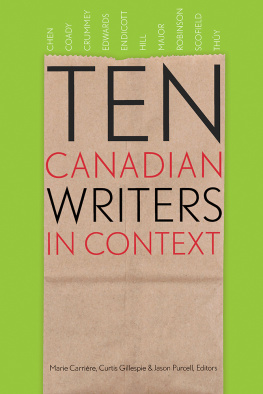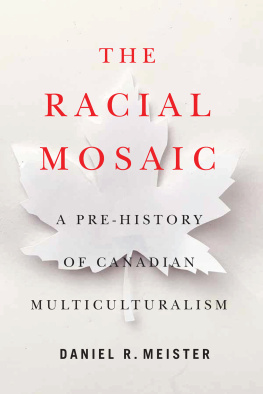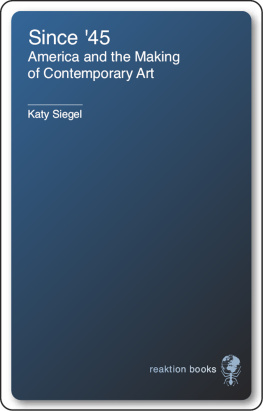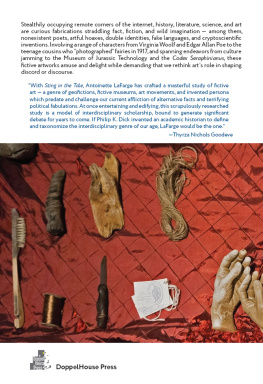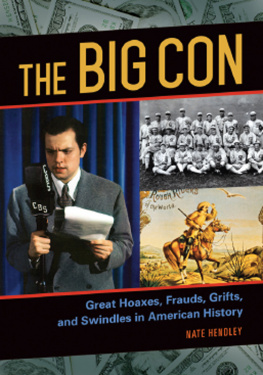This is not a hoax

This book has been published with the help of a grant from the Canadian Federation for the Humanities and Social Sciences, through the Awards to Scholarly Publications Program, using funds provided by the Social Sciences and Humanities Research Council of Canada. Wilfrid Laurier University Press acknowledges the support of the Canada Council for the Arts for our publishing program. We acknowledge the financial support of the Government of Canada. This work was supported by the Research Support Fund.

Library and Archives Canada Cataloguing in Publication
Title: This is not a hoax : unsettling truth in Canadian culture / Heather Jessup.
Names: Jessup, Heather, author.
Description: Includes bibliographical references and index.
Identifiers: Canadiana (print) 20190053577 | Canadiana (ebook) 20190053615 | ISBN 9781771123648 (hardcover) | ISBN 9781771123655 ( EPUB ) | ISBN 9781771123662 ( PDF )
Subjects: LCSH: Truthfulness and falsehood in art. | LCSH: HoaxesCanada. | LCSH:DeceptionCanada. | LCSH: Literary forgeries and mystifications. | LCSH: Tricksters.
Classification: LCC N8254.7 .J47 2019 | DDC 700/.453dc23
Cover design by Michel Vrana. Front-cover image by francescoch (figure), sorrapong (texture), both from istockphoto.com. Interior design by Michel Vrana.
Lines from Essay on What I Think about Most, from Men in the Off Hours, by Anne Carson, copyright 2000 by Anne Carson. Used by permission of Alfred A. Knopf, an imprint of the Knopf Doubleday Publishing Group, a division of Penguin Random House LLC. All rights reserved.
2019 Wilfrid Laurier University Press
Waterloo, Ontario, Canada
www.wlupress.wlu.ca
This book is printed on FSC certified paper and is
certified Rainforest Alliance and Ancient Forest
Friendly. It contains post-consumer fibre, is processed
chlorine free, and is manufactured using biogas energy.
Every reasonable effort has been made to acquire permission for copyright material used in this text, and to acknowledge all such indebtedness accurately. Any errors and omissions called to the publishers attention will be corrected in future printings.
No part of this publication may be reproduced, stored in a retrieval system, or transmitted, in any form or by any means, without the prior written consent of the publisher or a licence from the Canadian Copyright Licensing Agency (Access Copyright). For an Access Copyright licence, visit http://www.accesscopyright.ca or call toll free to 1-800-893-5777.
For Mari
Contents
PART ONE: A NOVEL IN THREE DIMENSIONS
Iris Husslers Historical Reconstruction at the Grange
PART TWO: UNSETTLING IMAGES
Decolonizing Ethnographies in the Artworks of Brian Jungen, Jeff Wall, and Rebecca Belmore
PART THREE: IMAGINING THE AUTHOR
The Heteronyms of Fernando Pessoa, Ern Moure, and David Solway
List of Figures
INTRODUCTION
Little Disrupters
ONE MORNING I WOKE UP, ATE BREAKFAST, WALKED TO THE ART Gallery of Ontario, toured through the basement of the historical home of the Grange, believing that I was seeing an archeological dig, did not see what I expected, and was changed. Since then, I have spent years of my life examining books and works of art in Canadian culture that at first glance appear to be factual, non-fictive, documentary, but in fact tell lies in order to wake people up. I have chosen the company of people who do not exist so that I can better understand the real, living relationships we navigate daily between make-believe and myth, trust and discomfort, truth and lies. What I came to realize is that these fictive companions have been accompanying me throughout my life. Hoaxes, in their various guises, are everywhere.
Attending elementary school in Regina, Saskatchewan, I first saw the paintings of Paul Kane, inaccurate depictions of Indigenous people and culture that I took to be truth in my childhood education and which I now find terribly troubling. In my teens, growing up in Vancouver, I frequently visited artist Jeff Walls large-scale cibachrome transparencies lit up on the plain white walls of the Vancouver Art Gallerynot knowing whether his photographs documented real life, captured images of posed actors, or something in between. At the age of twenty-five, I lived in Montreal and attended Ern Moures book launch of Little Theatres in a loft in Little Italy, where I first met the name of her heteronym, Elisa Sampedrn, believing Elisa to be real. In Toronto, on that fateful morning in my early thirties, I visited an archeological dig because I was intrigued by the life of a maid named Mary OShea, only to be caught in a hoax, a ruse, a trick, a performance art piece.
When I examined these experiences of being hoaxed, I came to understand that it was the experience of re-seeing that was, and continues to be, most captivating to me. I wanted to understand why I had believed these stories. What were the markers that made me feel that the stories were true? Why did I trust those markers? How often had this kind of tricking happened to me in other circumstances? How often had I believed something, only to discover later that it was not true as I had originally perceived?
Or, put a different way, how often had I trusted in a simple, uncomplicated belief, only to realize that life was much, much more complicated?
I began to realize that everything that mattered intensely and deeply to me had been revealedin some capacity, at some point in timeto be a hoax. Or, at least, that my original understanding of what love was, what a committed relationship was, what religious belief was, what it meant to be a Canadian, what it meant to be a student or a teacher andjumping back to my first ever critical theory class that made my head feel like it was going to explode reading Barthes and Derrida and Foucaultwhat my understanding of a text was, or an author, or what it is I do when I read: all of these moments and values became richer when my beliefs, habits, and unthinking expectations were revealed to me, and I was forcedoften against my will or desireto revise my thinking. Re-examining what I had previously taken for granted made me more grateful, more engaged, and more attentive to the most important aspects of my life.
No matter where and when one looks in the history and geography of human culture, tricksters can be found in stories told from Northern Europe to South America. Characters such as Loki, Hermes, Anansi, Coyote, and Raven create confusion and populate myths all over the globe. To museum visitors, it is extremely unclear which curios in the cabinets are fake and which are real.
Despite their universality, what began to interest me most were hoaxes that had happened in the places I had lived. By luck, Canada is my birthplace and my home, and like Linda Hutcheon in The Canadian Postmodern, I believe that when I write the impulse to situate is important and what I produce is inescapably a direct product of my own positioning. This book is an attempt to trace some of the unsettling moments I have had looking at art and reading literature in Canada that have surprised and shaped me as a writer and scholar.
Next page

